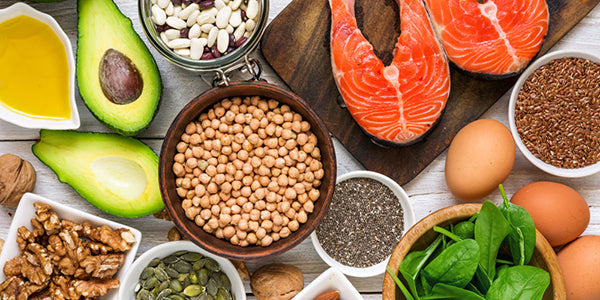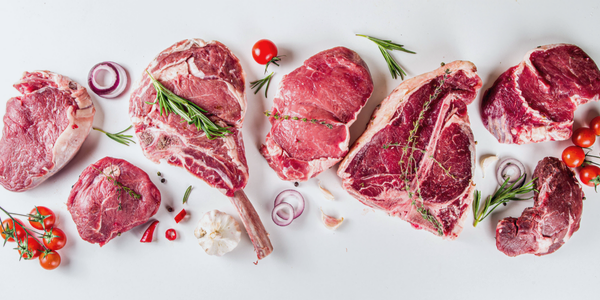
Healthy fats are particularly known as monounsaturated (MUFAs) and polyunsaturated fatty acids (PUFAs), which are even further broken down into omega-3 and 6 fatty acids.
Learn what makes these healthy fats so great and score a list of healthy fats to eat more often!
Benefits of Healthy Fats
Healthy fats are particularly known as monounsaturated (MUFAs) and polyunsaturated fatty acids (PUFAs), which are even further broken down into omega-3 and 6 fatty acids. They are widely known to provide a number of benefits to the body, including:
Promoting a Healthy Metabolism
In addition to an adequate intake of protein and carbohydrates, your body needs fat in order to maintain a steady metabolism. In fact, fat is one of the body’s best transporters and are responsible for transporting several nutrients throughout the body, including the fat-soluble vitamins A, D, E, and K.
These carriers are critical for carrying out a number of chemical reactions that help regulate growth, immune function, reproduction, and other components required for metabolic processes.
Helping Control Hunger and Weight
After we eat foods that contain fat, they take longer to digest compared to carbohydrate and protein. That being said, healthy fats help us feel fuller for longer bouts of time and control hunger levels, which in turn, reduces the risk of overeating later on.
And not to mention, regulated hunger and satiety is an essential component for maintaining a healthy weight or losing those unwanted pounds!
Reducing the Risk of and Managing Chronic Diseases
The intake of healthy fats has shown to reduce inflammation in the body, which overall lowers the risk of a number of chronic diseases such as:
• Heart Disease
Unlike unhealthy fats (trans fat in particular) that have shown to increase heart disease risk, healthy or “good” fats work to reverse it. Furthermore, a Mediterranean style-diet emphasizing high amounts of monounsaturated fatty acids (MUFAs) and polyunsaturated fatty acids (PUFAs) has shown to promote heart health.
• Metabolic Syndrome
A Mediterranean diet may also reverse metabolic syndrome, a cluster of conditions shown to increase the risk of heart disease, stroke, and diabetes.
10 Healthy Fat Foods
1. Avocados
Since most fruits are known for their carb content, avocados are extremely unique in the fact they supply healthy fat. These fruits are rich in heart-healthy monounsaturated fats, along with fiber, potassium, folate, copper, and vitamins B6, C, E, and K.
So instead of going for donuts and other pastries packed with unhealthy fats, start your day with these 15 avocado toast recipes. And if you still are not a fun of avocado, these recipes for avocado lovers are sure to change your mind!
2. Dark Chocolate
Yes, you read that right…
Both dark chocolate and cocoa contain both saturated and monounsaturated fats, along with a healthy dose of various vitamins and minerals and powerful antioxidants known as polyphenols, which has shown to support heart and brain health.
To the benefits of dark chocolate optimized, keep sugar in check by using cocoa powder in cooking and look for dark chocolate products with minimal added sugars.
3. Eggs
Though once feared related to their cholesterol content, ongoing research suggests dietary cholesterol does not directly influence blood cholesterol.
That being said, eggs are an egg-cellent healthy fats to eat in the morning hours, as the high protein and healthy fat can help stabilize hunger levels and leave you feeling content leading up to lunchtime.
Eggs are also a rich source of vitamin D, choline, selenium, phosphorus, and B vitamins.
4. Fatty Fish
Fatty fish, such as salmon, trout, tuna, herring, and mackerel, are significant sources of omega-3 fatty acids, a type of PUFA that appears to decrease the risk of coronary artery disease.
Strive to eat 8 to 12 ounces of fatty fish on a weekly basis, along with choosing wild-caught over farm-raised sources to help reduce the the consumption of harmful toxins.
5. Full-Fat Yogurt
Going full-fat (and Greek) with your yogurt grants a creamy, decadent snack that is sure to keep you satisfied on hours an end.
And rather than going for flavored varieties overflowing with added sugars, add natural sweetness with a half cup of your favorite berries, along with added crunch from nuts and seeds.
6. Grassfed Beef
While all beef supplies protein, iron, and zinc, grassfed varieties offer a little more…
In fact, grassfed beef supplies polyunsaturated fats (PUFAs) and a larger amount of omega-3 fatty acids compared to grainfed beef, along with being lower in saturated fat.
7. Nuts and Seeds
Nuts and seeds are power-packed with MUFAs and PUFAs, along with supplying plant-based protein and dietary fiber.
To keep calorie content moderated, aim for a ¼ cup serving or a small handful of nuts and seeds, including almonds, cashews, and sunflower seeds. Accompany with dried fruits and dark chocolate shavings for a nutrient-dense trail mix.
8. Olive Oil
Using olive oil in place of butter and margarine reduces saturated and trans fat while increasing monounsaturated fat content. And aside from its valuable healthy fat content, olive oil is also a significant source of vitamins E and K and exhibits antioxidant properties.
While well-known for its protective role against heart disease and cellular damage, extra virgin olive oil (EVOO) has also shown to reduce after-meal blood sugar levels.
9. Peanut Butter
Produced by peanuts, peanut butter and other nut butters are also excellent healthy fat sources, provide plant-based protein, and are relatively low in carbohydrate.
It is important, though, to check out the ingredient label when selecting a nut butter. As a general reference, choose products that only contain the nut and maybe a little salt and avoid ones with added oils, such as palm oil, and sugars.
10. Soybeans
Not only are soybeans notable for their plant-based protein and fiber content, but also full of both MUFAs and PUFAs.
They are also versatile in the kitchen, including adding onto salads, mixed into rice dishes, simply enjoyed boiled for a nutritious snack.







